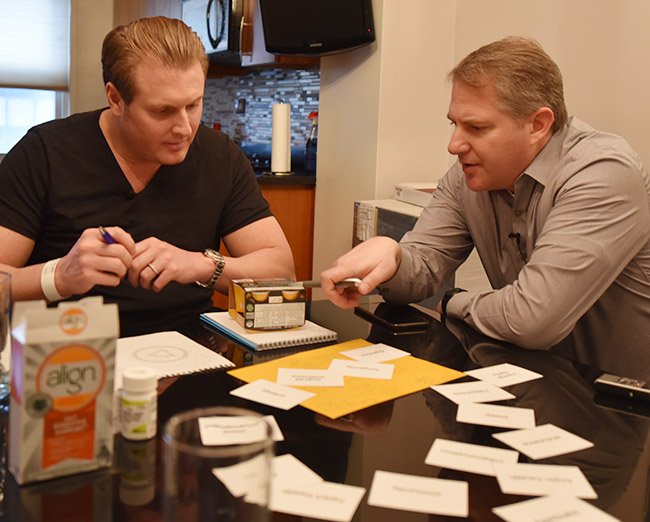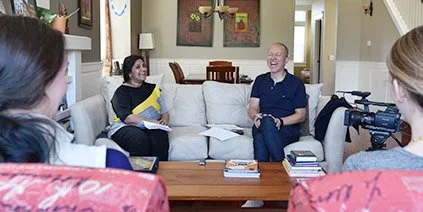Oprah, Anderson Cooper, and Howard Stern: 6 Critical Interview Skills To Learn From the Masters
An interview, when done well, appears effortless and fluid. It informs, surprises, and conjures emotion.
Great interviewers share the ability to be ‘in the conversation.’’ They gain access to the hidden recesses of thought and feeling. They masterfully make clear the previously unclear. They forge a connection we did not see coming.
Who are some great interviewers? Well, Oprah, Anderson Cooper, and Howard Stern, just to name a handful. Search online and watch their past interviews. Each, in their own way, gives us more -- more detail, more context, more emotion, more story.
Oprah disarms and connects by creating a safe space for her interviewees to open up and share. Cooper does his homework and guides his interviewees through a timeline of events, ideas, and outcomes. And, Stern. Well, if you haven’t observed his interviews, you should. Although he gets a bad rap as controversial shock jock DJ, Stern truly amazes as an interviewer. He prompts people to tell their stories, in an incredibly realistic, honest way. He avoids the obvious questions and instead asks the questions that a close friend or confidante might ask … the stuff we really care about.
Were Oprah, Cooper, and Stern always this good at their craft? Not at all. By their own admission, their skills were honed through experience and passion.
While we may not be tasked with interviewing world leaders or celebrities, as insights & brand strategy practitioners, interviewing is at the core of what we do.
So, what makes for a great interview?
1. Do Your Homework
There are more than a couple philosophies when it comes to interviewing.
One belief that has strong merit is the notion of approaching an interview with the mind of a newcomer. The openness of the uninitiated. This approach is valid. You certainly don’t have to be THE expert on a subject to conduct a great interview. Oftentimes, much more can be gleaned in an interview by a subject-matter novice. But, there is a fine line of being blissfully unaware and expertly knowledgeable. And, it is the balance here that works best.
Before entering into an interview, do your homework. Get familiar with the category or sector, the key players and the strategies. Learn about the biography (or resumé) of your interviewee. Use this to form your own hypotheses and questions. Familiarity and common connection points will serve you well in building rapport and engagement. Plus, you can spend less time on the “what” of a situation and more on the “what does it all mean” aspects of it.
2. Be in the Moment
Be present and avoid distractions that pull you away from the moment of connection and conversation. This can be very hard to do, particularly with research. You’ve got many eyes observing you, data that must be captured, and timelines that must be met. Nonetheless, your role is to be present and to show them that their perspective matters.
“Every single person you will ever meet shares that common desire [to be validated]. They want to know: ‘Do you see me? Do you hear me? Does what I say mean anything to you?’… Understanding that one principle, that everybody wants to be heard, has allowed me to hold the microphone for you all these years.” –Oprah
Other Tips:
Avoid taking pages of notes during the interview; instead rely on technology – audio or video recording -- to help you out. If you must, reserve the paper and pen in front of you to jot down a quick word or phrase based on what you hear to remind yourself to ask about something or follow-up on it later in the interview. This is just a memory jogger and NOT actual notes.
Plant both feet on the floor to ground yourself.
Turn toward the interviewee, lean in, and make eye contact. They are the focus.
Put away/silence cell phones and resist the urge to look at it.
Don’t read your questions verbatim. Doing so makes it feel like a test and not a conversation.
3. Spend Time on the Inconsequential (aka, don’t spend all of your time on the obvious)
We’ve all heard the phrase “sometimes it’s the little things that matter most.” This is true when it comes to interviewing.
Eager to get THE answer, we sabotage ourselves. We hyper-focus on what we believe to be the big questions and topics. In doing so, we may miss out on the meaning, the emotion behind it all. It’s ok to “off road.” In fact, great interviewers are comfortable calling an audible. They dive into something a little more deeply. They change the course of the conversation when an interesting or new comment or idea has surfaced. While it may seem inconsequential, a few well-placed follow-ups can illuminate previously untapped territory or emotions that can suddenly explode with a host of insight.
4. Don’t Skip the Pleasantries
You need the person you are interviewing to like you. General, get-to-know-you questions are important for several reasons. One, it eases any fear or anxiety on the part of the interviewee. Two, it begins that rapport-building. And finally, it opens up the discussion in a non-confrontational, non-aggressive, entirely calm way. It establishes that this will be a safe space in which to open up and share.
Now, this doesn’t mean you need to continuously ingratiate yourself. What it does mean is you need to emulate the open and interested vibe that you want them to reciprocate. You need to show you care about what they have to say. Refer to them by their name, return back to what they previously told you about their family, their job, their interests. Show them you’ve been listening. *SEE PREVIOUS POINT #2 ON BEING IN THE MOMENT.
5. Leave Breathing Space
The best interviews all have (and require) some breathing room. A pause. A smile. A laugh. A brief nod. These are your tools to encourage conversation.
Make room for silence. Allow the person to consider your questions and answer them. Remember, you want description, detail, context. In order to get those things, you have to provide space in a non-hurried, open mode of conversation.
Be ok with this and don’t be deterred from asking an open question and literally sitting back to take in the answer before jumping in with another litany of questions and follow-ups.
6. Gently Guide vs. Abruptly Steer … To a Point
It’s ok to push back and challenge but do so gently. Your goal is not to provoke. It is to offer up a thought that may not fully align with what the other person has said and ask them their thoughts on it.
Occasionally, you may run into the person who, despite your best guidance, attempts to “take over” the conversation. What does this look like? Well, their answers may meander from one idea to the next. They may try to turn the tables and ask the questions of you. A one-minute response suddenly turns into an eight-minute soliloquy. Gentle guidance will help get everyone back on track. Restate the purpose while offering positive regard for their energy. Or, ask to table a topic in order to move onto the next. Always thank them but be clear when you need to move on. It’s ok to say, “let’s move on.”
And, of course, practice. practice. practice. Re-visit your past interviews. Review what worked and what didn’t. Once the basics are covered, then it becomes a matter of finding your own voice and style.
No two people will ever interview in the same, exact way. We bring ourselves, our inflections, our body language, and our tone to the interview in order to achieve an authentic level of engagement. Taking tips and tricks from others works. But don’t try to be a copy of Oprah or Howard Stern. Be yourself.
Speaking of creating a safe space to open up and share, here are two of our favorite, recent thought pieces that deserve the spotlight.
NAVIGATING TO A NEW NORMAL CHAPTER 5: LISTENING – BLACK LIVES MATTER
For more “how to’s” and practical advice on improving your insights game, check out these other posts:
STOP BEING INTIMIDATED: 3 TIPS FOR TALKING WITH PEOPLE WHEN YOU HAVE NOTHING IN COMMON



